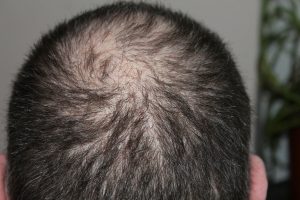 The science is in and it says that it’s true: stress really does result in hair loss and thinning hair, specifically, chronic stress. The results were published in the esteemed journal, Nature, demonstrating that chronic stress inhibits hair growth. We’ve discussed chronic stress on our website before, and the dangers of it health-wise, and here is yet another reason why you need to get your stress levels under control.
The science is in and it says that it’s true: stress really does result in hair loss and thinning hair, specifically, chronic stress. The results were published in the esteemed journal, Nature, demonstrating that chronic stress inhibits hair growth. We’ve discussed chronic stress on our website before, and the dangers of it health-wise, and here is yet another reason why you need to get your stress levels under control.
Video Link: https://vimeo.com/553920122
Video Download: Click Here To Download Video
Video Stream: Click Here To Stream Video
Sustained Stress Prolongs “Resting Phase” of Hair Follicle Stem Cells
Chronic stress causes the release of the hormone corticosterone. This hormone then causes the “resting phase” of hair follicle stem cells (HSFCs) to last longer, slowing down or preventing hair turnover. One of the experiments on the rodent models included adrenalectomy (removal of one or both adrenal glands) which stopped the secretion of stress hormones, or corticosterone. Once the presence of these hormones was removed, the HSFCs resumed more frequent regeneration and hair turnover.
In this study, both adrenal glands were removed, entirely removing the source of corticosterone. Both experimental (adrenalectomy) and control mice were then shaved and their hair coats monitored over time period of several months.
The researchers also looked at the results of increasing corticosterone levels in mice. In one set of mice, they were given supplemented corticosterone via their drinking water and in the second set, the mice were exposed to stress triggers. These included tilting the cage and causing sudden light-dark changes. The hair cycle phases were determined visually and also confirmed histologically. The scientists also used a technique called florescence-activated cell sorting to actually identify the cells that the corticosterone was acting on and affecting HFSC activity.
 Removing Stress Hormones Increased Number of Hair Cycles
Removing Stress Hormones Increased Number of Hair Cycles
In general, the researchers found that removing both adrenal glands activated the stem cells and enhanced their generation. Specifically, the adrenalectomy mice had an average of 10 synchronized hair cycles over the course of 16 months while the control mice only had three hair cycles in the same time frame, and their phases were synchronized. Over the course of the 16 months, the control mice experienced longer and longer telogen phases (resting phase; hair follicle does not grow) with random and asynchronized entry into the anagen phase (growing phase). The telogen phase lasted approximately two weeks in the adrenalectomy mice.
In the mice drinking the corticosterone-supplemented water, the hormone was found to severely inhibit hair growth. The corticosterone mice demonstrated a longer telogen phase when compared to the control mice. Once the corticosterone was removed, the mice entered anagen phase which suggests that the effects of stress on hair growth is actually reversible. Great news!
The mice that experienced external stressors but no corticosterone-supplemented water, the results were actually similar. Their telogen phases were also prolonged and the effect reversible by performing adrenalectomies.
 How to Prevent Chronic Stress
How to Prevent Chronic Stress
Understand that chronic stress can cause serious health issues, not just hair loss. These health issues include mental issues, muscle aches, high blood pressure and constant illness due to a weakened immune system. Other issues include heart disease, depression and anxiety. All of this can become very serious for many adults and teenagers.
In order to prevent chronic stress from developing to the point of severe health problems, try to limit your tasks and obligations to what you can actually mentally and physically handle. If you find yourself being stressed out over all the stuff you have to do, it might be time to reevaluate these tasks and remove one or more of them from your daily to-do list. Ask for help or figure out what is non-essential.
Another big things is sleep. Sleep is so important and our bodies need it in order to recuperate and heal. Dealing with stress can lead to laying there worrying, not relaxing and not getting to sleep promptly. Try to allow ample time before your bedtime to decompress and truly relax. Do not veg out on the TV or phone – read a book, relax in the bath with music or meditate.
Harvard Medical School actually recommends something called “belly breathing.” The doctors say that it is a powerful tool in restoring your body after experiencing a stress response. Abdominal breathing regulates your heart rate, improves the levels of oxygen in the blood and releases tension in the body. Just sit or lay down and take a deep breath through your nose until your chest is full of air and your belly expands. Then exhale. Try doing this breathing technique for about 10-20 minutes a day.
References
Contact Us Today For A Free Consultation

- Ten Simple Steps That You Can Take To Knock Out Stress [Last Updated On: May 2nd, 2024] [Originally Added On: June 11th, 2020]
- Natural, Simple Ways to Improve Your Sleeping Habits [Last Updated On: April 18th, 2024] [Originally Added On: June 26th, 2020]
- Ten Ways to Manage Cholesterol and Testosterone Levels [Last Updated On: May 30th, 2024] [Originally Added On: July 16th, 2020]
- Five Kinds of People that Have a Lot of Sex! [Last Updated On: April 11th, 2024] [Originally Added On: July 17th, 2020]
- Ditch the Alcohol if You Want to Maximize the Benefits and Gains From Weightlifting [Last Updated On: January 22nd, 2024] [Originally Added On: July 18th, 2020]
- 13 Issues That Can Kill Your Libido [Last Updated On: March 15th, 2024] [Originally Added On: July 19th, 2020]
- Ten Ways to Enhance Your Metabolism [Last Updated On: June 28th, 2024] [Originally Added On: July 20th, 2020]
- Fourteen Common Causes of Fatigue and What You Can Do to Improve Your Energy Levels! [Last Updated On: June 21st, 2024] [Originally Added On: August 4th, 2020]
- Testosterone's Effects Upon the Human Body [Last Updated On: June 11th, 2024] [Originally Added On: August 9th, 2020]
- Fifteen Foods That Can Help You Get Your LDL Cholesterol Under Control [Last Updated On: May 1st, 2024] [Originally Added On: November 28th, 2020]
- Exercise Optimizes Testosterone Production [Last Updated On: January 29th, 2024] [Originally Added On: February 13th, 2021]
- How to Get Bigger Arms [Last Updated On: November 25th, 2024] [Originally Added On: March 14th, 2021]
- Magnesium and Preventing Kidney Stones [Last Updated On: October 22nd, 2024] [Originally Added On: January 18th, 2023]
- Get Pro-active, Don’t Depend on a GP only! [Last Updated On: October 24th, 2024] [Originally Added On: February 1st, 2023]
Word Count: 770





















